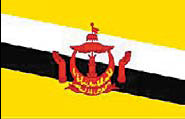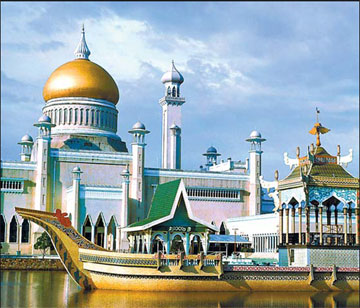The state of Brunei - which celebrated its National Day on Saturday - has been ruled by a succession of Sultans tracing their royal lineage back to the 15th century. Officially known in Malay as Negara Brunei Darussalam, or Abode of Peace, this wealthy Southeast Asian nation regained independence from the United Kingdom on January 1, 1984.
 This tiny country, with a land area of 5,765 sq km, is located 443 km north of the Equator on the north coast of the island of Borneo and is surrounded by the east Malaysian state of Sarawak but for its coastline meeting the South China Sea. Its equatorial climate is hot, humid and wet year round.
This tiny country, with a land area of 5,765 sq km, is located 443 km north of the Equator on the north coast of the island of Borneo and is surrounded by the east Malaysian state of Sarawak but for its coastline meeting the South China Sea. Its equatorial climate is hot, humid and wet year round.
Of Brunei's population of 374,577, two-thirds is of Malay origin. The remainder is comprised of Chinese, Indian and indigenous Malay groups. Brunei is also home to a large number of expatriates. These include Indonesian and Filipino domestic workers, as well as professionals from Western countries, predominantly Australia and Britain.
Malay is the official language but English is widely spoken, and a significant minority speaks Chinese. Although the official religion is Islam, other faiths are also practiced.
Sultan Omar Ali Saifuddin Mosque is the most famous landmark of Brunei. File Photo
 The Sultanate of Brunei was very powerful from the 14th to the 16th century, with a realm covering the whole island of Borneo and the southwestern Philippines. The decline of the Empire of Brunei came in the 19th century with the loss of much of its territory to the White Rajahs of Sarawak. Brunei was divided in half, and from 1888 to 1985 was a British protectorate.
The Sultanate of Brunei was very powerful from the 14th to the 16th century, with a realm covering the whole island of Borneo and the southwestern Philippines. The decline of the Empire of Brunei came in the 19th century with the loss of much of its territory to the White Rajahs of Sarawak. Brunei was divided in half, and from 1888 to 1985 was a British protectorate.
Today, Brunei's small but prosperous economy is built on both domestic and foreign entrepreneurship as well as government regulation. Crude oil and natural gas production account for nearly half of its GDP and more than 90 percent of exports, while domestic production is supplemented with large overseas investments.
Brunei is a tax-free society, where citizens enjoy one of the highest per capita incomes on earth, while the state provides a robust welfare system. Brunei's future directions include boosting its banking and tourism industries, with plans by its national airline Royal Brunei to become a hub for international travel between Europe and Australia and New Zealand, as well as servicing major Asian destinations.
Diplomatic ties between Brunei and China were established in September 1991, and bilateral relations have seen steady growth since, with frequent official exchanges and visits. Governments of the two countries have signed documents of cooperation covering a wide range of areas including economy and trade, energy, aviation, health, culture, tourism and education. Trade volume between China and Brunei reached nearly $300 million in 2004.
(China Daily via Viva Goldner February 23, 2008)